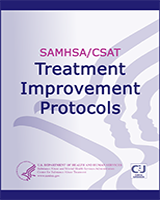| Diagnostic criteria for alcohol dependence are
subsumed within the DSM-IV's general criteria for substance
dependence. Dependence is defined as a "maladaptive pattern of
substance use, leading to clinically significant impairment or
distress, as manifested by three (or more) of the following,
occurring at any time in the same 12-month period" (American
Psychiatric Association, 1994, p. 181). There are special
considerations when applying DSM-IV criteria to older adults
with alcohol problems. |
|
Criteria
|
Special Considerations for Older Adults
|
Tolerance
| May have problems with even low intake due to increased
sensitivity to alcohol and higher blood alcohol levels |
Withdrawal
| Many late onset alcoholics do not develop physiological
dependence |
Taking larger amounts or over a longer period than
was intended
| Increased cognitive impairment can interfere with
self-monitoring; drinking can exacerbate cognitive impairment
and monitoring |
Unsuccessful efforts to cut down or control use
| Same issues across life span |
Spending much time to obtain and use alcohol and to
recover from effects
| Negative effects can occur with relatively low use |
Giving up activities due to use
| May have fewer activities, making detection of problems more
difficult |
Continuing use despite physical or psychological
problem caused by use
| May not know or understand that problems are related to use,
even after medical advice |
